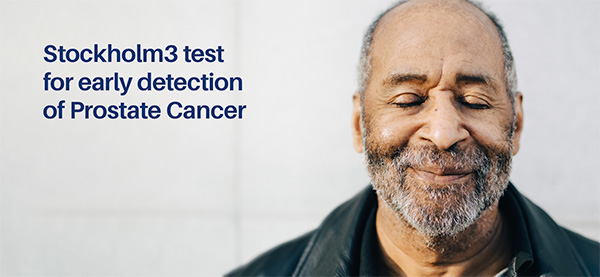Stockholm3 test for risk evaluation of prostate cancer

TDL will be present at the BAUS Section of Oncology Annual Meeting 2024 on 14-15th November and two additional scientific abstracts will be presented on the Podium:
- A comparison of Stockholm3, serum biomarkers, and risk calculators to predict prostate cancer in a diverse cohort: Evaluation of the Stockholm3 Multi-Ethnic SEPTA Trial
- Are we missing aggressive cancer with PSA screening alone? Biochemical recurrence after radical prostatectomy: Evidence from the STHLM3 trial
Stockholm3 is a blood test that helps to predict risk of clinically significant prostate cancer in men aged 45–74 years with a PSA level greater than 1.5 ng/ml where no previous diagnosis of prostate cancer has been made. Stockholm3 combines genetic markers, proteins and clinical data in an algorithm to help identify clinically significant prostate cancer. It allows for screening in primary or secondary care settings and is equivalent across diverse ethnicities. Apart from a strong health economic case, the result from a Stockholm3 test can be used to reduce unnecessary imaging or invasive diagnostic procedures.
Click to view Stockholm3 in a Multiethnic Cohort for Prostate Cancer Detection Abstract*
Key characteristics of Stockholm3
- Increased early detection – increased sensitivity
- Increased specificity reduces over testing, unnecessary biopsies by 50% and treatment
- Higher accuracy compared to PSA, PSAD and prostate cancer risk calculator
- Can distinguish between aggressive and benign tumours in a way that PSA testing cannot
- Validated in combination with MRI and in multiple ethnicities
- Shown to detect clinically significant prostate cancers in PSA levels of 1.5–2.9 ng/ml
- Reduces healthcare costs
Stockholm3: diagnostic patient pathway, including STKR (reflex testing to STK3 from PSA with results of >1.5)
|
Gender |
Male |
|---|---|
|
Intended age |
45–74 years, not had prostate cancer, PSA >1.5 ng/ml |
|
Clinical data required |
Age, family history of prostate cancer, previous biopsies, use of 5-alpha reductase inhibitors (Avodart [Dutasteride] or Proscar [Finasteride]. |
|
Test code STK3 |
2 x EDTA tubes must be received within 24–36 hours of sample taking. TAT up to 2 weeks |
|
Test code STKR |
PSA levels of >1.5 combined with reflex testing to STK3. 1 x SST, 2 x EDTA tubes must be received within 24–36 hours of sample taking. TAT up to 2 weeks. |
A Stockholm3 risk score of >11 is considered to be an indicator of clinically significant prostate cancer risk and referral to a urologist for further investigation is recommended.
For further information about the test please contact stockholm3@tdlpathology.com. Don’t post samples to TDL as the timing for receipt of samples within 24–36 hours is important.
Certificates of Attendance for Continuing Professional Development (CPD)
TDL held webinars over the summer with presentations for Stockholm3 and Endotest for endometriosis.
Please contact stockholm3@tdlpathology.com or endotest@tdlpathology.com with the date(s) of your attendance to receive a Certificate of Attendance for CPD.
Updated Guide to Swabs – Culture and PCR
Specialist swabs and their essential functions, and differences between manufacturers, can be very confusing – and ordering and using the correct swabs for the sample and test to be carried out has become much more important than it used to be.
Patient Request Forms and swabs must both be labelled with details of the body site from where the swab was collected. For cultures this is particularly important as the swab site will determine the appropriate culture medium required to target the most likely pathogens.
The appropriate swabs are listed and illustrated to help with ordering supplies for the practice correctly.
Click here to download the TDL Guide to swabs PDF
Click here to download TDL Supplies Order Form
TDL Couriers in Uniform
 Evidence confirms that practices and clinics think it is important for the couriers collecting their specimens to wear an identifiable uniform and that the identity of the courier is as important as the purpose of their visit. In a survey of 1000 practices our customers told us how important it is that couriers wear a uniform. In a survey of practices, our customers confirmed:
Evidence confirms that practices and clinics think it is important for the couriers collecting their specimens to wear an identifiable uniform and that the identity of the courier is as important as the purpose of their visit. In a survey of 1000 practices our customers told us how important it is that couriers wear a uniform. In a survey of practices, our customers confirmed:
- 82% of respondents prefer that TDL couriers wear a company uniform.
- uniforms are a key source of identification and convey professionalism.
- 40% of practices raised a concern that a non-uniformed courier could be considered a risk.
- couriers wearing uniforms are a reflection on TDL and they represent the company every time that they collect samples.
TDL Myeloproliferative Neoplasm NGS Screening Panel
A Myeloproliferative Neoplasm NGS Screening Panel now replaces tests that were requested individually – JAK2, V617F, JAK2 exon 12, CALR and MPL – and also covers a wider range of rarer mutations.
Advantages of the Myeloproliferative Neoplasm NGS Screening Panel:
- Rapid turnaround of the test – quicker diagnosis.
- 45 genes tested, with the option for additional testing of 30 RNA fusion driver genes (see the Leukaemia (Rapid Acute) DNA and RNA NGS Panel), instead of 4 genes tested separately.
- All new chronic myeloid leukaemia (CML) patients are automatically screened for tyrosine kinase domain variants at diagnosis.
- Rapid identification of potential candidates for clinical trials.
- Early identification of high-risk myeloproliferative neoplasms which may require more aggressive treatment strategies, such as a stem cell transplant.
For further information about this panel, please contact Dr Lisa Levett, Director of TDL Genetics and Molecular Pathology (lisa.levett@tdlpathology.com)
Ziwig Endotest®for Endometriosis
The updated Ziwig Endotest for endometriosis was introduced again in June 2024 with revised turnaround times of 2–3 weeks.
The Ziwig Endotest® won International Prix Galien 2024 in the category ‘Best Medical Technology Product with greatest potential impact on human health’. This recognition by International Prix Galien confirms the international contribution for improved diagnosis of this condition.
Ziwig have gained CE-IVD accreditation for Endotest saliva samples to be self-collected by the patient without clinician supervision. This test is not a patient self-referral and requests for testing must be made by the patient’s GP or Consultant. Results will be sent to the referring clinician, not to the patient.
This provides a choice for the practice by being able to offer patients the opportunity to self-collect whilst continuing with supervised collection for others.
Click here to download the TDL Endotest Self-collection Request Form
Click here to view TDL Endotest Sample Taking Instructions
|
Test |
Code |
Sample Reqs |
TAT |
|---|---|---|---|
|
Ziwig Endotest |
ENDT |
Saliva for MicroRNA testing Saliva collection kits are provided by TDL for practice use or for patient self-collection – please contact endotest@tdlpathology.com to order kits |
2–3 weeks |
Update for Self-collect Testing
Usability, clinically approved stability and the comparative performance of vacutainer vs microtainer are the essential requirements for acceptance for self-collect tests.
Newly approved tests for Self-collect tests now include:
- FBC – with Hb, WCC, RBC and Platelets
- Apolipoprotein A1, Apolipoprotein B can now be combined with Lipoprotein(a), Lipase, hsCRP and Lp-PLA2 testing
- Hormones – using Plain (Red) TDL Tiny
Requests by doctors for Self-collect kits for their patients continue to grow across targeted areas of healthcare – sexual health, genetic conditions, pre-admission work ups, companion diagnostics. All Self-collect samples are sent to the laboratory by Royal Mail Tracked24 for testing.
The range of tests for practices who want to order Self-collect kits for their patients has been updated (October 2024). The option for vacutalner kits to be carried out by a patient’s local phlebotomy services can also be requested through orders@tdlpathology.com.
Click here to download the TDL Self-collect brochure
Discontinued tests
Laboratory tests may be discontinued at short notice for a variety of reasons such as changes with analyser and reagent manufacturers, supply chain, suspension or regulatory review. Depending on the reason, tests may be discontinued for the short or long term, or even permanently, and sometimes with very little notice. Whilst every effort is made to provide a comparable alternative accredited service this is not always possible.
Where alternative services are available, turnaround times, normal values and methodology may be different. When there is no suitable alternative, the laboratory will notify as it may not be possible to store samples for the long term waiting for reinstatement of a test, and it may be necessary to discard them or return them to the referrer.
